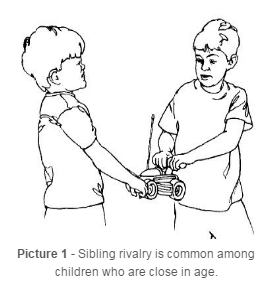Sibling Rivalry

Sibling rivalry is competition or conflict between children being raised in the same family. It is a natural part of growing up that will impact how they learn to resolve problems. Sibling rivalry can occur when children compete for caregivers’ attention, being at very different developmental stages or just having different personalities.
Sibling rivalry is most common with brothers and sisters of the same sex and when children in the family are close in age, less than 2 years apart. (Picture1). It occurs among children of all ages. If one child in the family has a long-term illness or special needs, this can also lead to sibling rivalry. Other children in the family may feel left out. When the ill child needs special attention, brothers and sisters may feel less important.
Signs of Sibling Rivalry
Children under 9 years of age may show these signs:
- Fighting (verbal or physical attacks)
- Frustration
- Demanding attentions
- Telling on sibling (tattling)
- Regressive acts, like bed wetting or thumb sucking
Older children may show these signs:
- Frequent arguing
- Competing for friends, grades or in sports
- Taking out frustrations on objects pets or other people
Reaction to a New Baby
Another common cause of sibling rivalry is a new baby in the family. When the baby comes home, other children may:- Show anger toward the baby, like hitting, kicking, punching or biting
- Ask for the baby to go back to where they came from
- Demand more attention when the parent is with the baby
Helping Your Child Adjust to a New Baby
- Remind each child often that they are loved. Let your children know you respect all their feelings, even the angry ones.
- Involve your children in getting ready for the new baby to come home.
- Tell older children early that you are bringing a new baby into the home. This gives them more time to prepare.
- If an older child has to move to a new room, make the move early.
- Let the older child help with baby's care and be sure to give lots of praise. However, NEVER leave the baby alone with a toddler.
- Work with a toddler on new skills such as toilet training before the new baby is born. If this cannot be done, wait a few months after the baby’s birth.
- If possible, have your children 2 to 3 years apart.
- Do not punish your child if they start acting like a baby again. This will pass as they get older and start to accept the new baby.
- If children continue to have problems adjusting, think about getting professional counseling.
How to Manage Sibling Rivalry
Sibling rivalry is not all bad. In fact, it can be helpful. It can teach children how to understand other people’s points of view, compromise and solve problems. Parents should not get too involved in their children's arguments unless there is risk of physical harm. Whenever possible, parents should encourage them to resolve the problem themselves.
Here are some ways to manage sibling rivalry:
- If the conflict is very heated, separate the children until they are calm. Then, coach them to resolve the problem.
- Be a role model. Teach your child positive problem-solving skills.
- Have rules in your home, like keeping your hands to yourself and no name-calling.
- Praise your children when they are working hard and following directions. This helps build their self-confidence.
- Listen to your children and their needs.
- Spend time with your children. Let them know that they are loved.
- Avoid situations that may lead to jealousy.
- Do not play favorites. Be fair and consistent.
- Do not compare one child to another.
- If the arguing or acting out gets to be too much, give yourself a time out and get away from the situation.
For More Help
If signs of sibling rivalry last more than 6 months or pose danger to the physical or psychological safety of any family member, you may want to get help.
You may contact:
- Big Lots Behavioral Health Services at Nationwide Children’s Hospital. Call (614) 355-8080. Individual and family counseling is provided for children and their families.
For more information on healthy parenting, you may also contact:
- your child's doctor
- a local mental health center
- a leader at your place of worship
- your local library
- your child's school or day care center
- Nationwide Children's Hospital Community Education at (614) 355-0662 or online. Active Parenting classes are offered throughout the year.
